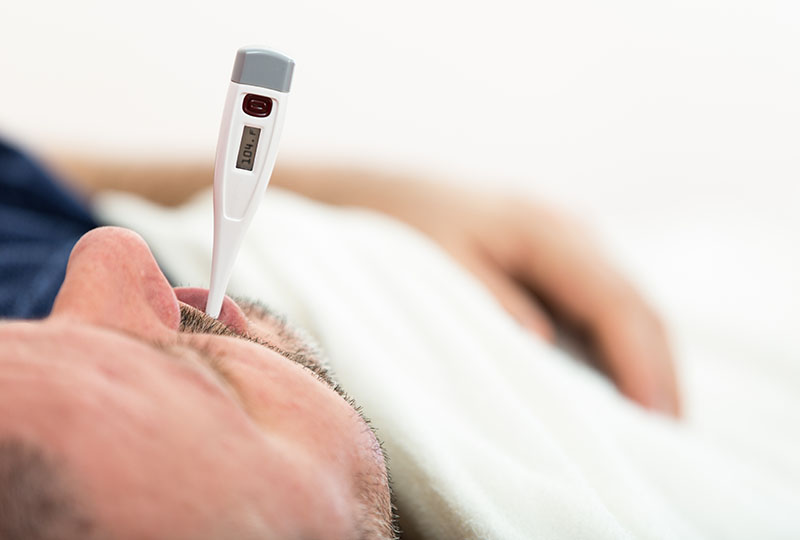Should adults take steps to reduce a fever and can fevers do harm?
During a recent cold, I spiked a temperature of more than 104 degrees for a few hours. Maybe it’s a guy thing, but I tend to let fevers run their course. I was even drinking hot tea and wearing extra clothes to “burn out” those nasty germs. My wife was having no part of my tough-it-out response.
She was saying, “Why be miserable, when you can take something to bring your fever down.” My rebuttal was that fever is a natural defense against infections.
By itself, a high fever in healthy adults that spikes to 103-106 degrees, measured orally, over a few hours is generally harmless. The exceptions are for those at extremes of life such as infants 3 months and younger or frail elderly adults, said Richard G Lane, M.D., a primary care doctor at Vanderbilt Medical Group in Franklin. If you’ve recently had surgery or have a compromised immune system you should also see a doctor if you develop a fever.
For otherwise healthy adults, it’s time to see a doctor when a high temperature is combined with one or more of the following problems:
- Fevers higher than about 103 degrees that last longer than three days;
- A fever that will not respond to fever-lowering medicines;
- Loss of consciousness;
- Seizures;
- Stiff neck;
- Trouble breathing;
- Severe pain or swelling anywhere in the body; and
- Painful urination.
How high is too high?
Orally measured temperatures above 107.6 can damage the body, but they are very rare. Your body is amazingly adept at keeping its temperature below the point of baking your brain. Studies show that fevers can boost the effectiveness of your immune system’s infection-fighting T-cells and prevent some microbes from thriving. Deaths from body temperatures above the safe zone are often because of heat strokes caused by external temperatures and dehydration and not related to fever.
Treating a fever
In the end, my wife and my fever wore me down. I decided to listen to her advice and take something when I couldn’t sleep. Remember that medicines only reduce fever by 2 to 3 degrees. Doctors recommend the following steps to help adults feel better.
- Drink plenty of fluids;
- Sleep as much as possible;
- Take a warm bath or apply moist washcloths to your forehead and wrists; and
- Take ibuprofen, acetaminophen, naproxen, or, if you are an adult, aspirin.
The American Academy of Pediatrics states that aspirin or products containing aspirin should not be taken by anyone younger than 19 years during fever-causing illnesses.
Related: ER or walk-in clinic? How to make the call

Vanderbilt Health operates a variety of walk-in clinics in Middle Tennessee, including some with Williamson Medical Center, to take care of everything from sprains and sport injuries to flu shots, fevers, coughs and rashes. Search locations and learn more about the conditions treated there.
If you do get sick, use our online flu tool to decide whether self-care at home or a visit to your healthcare provider is in order.

